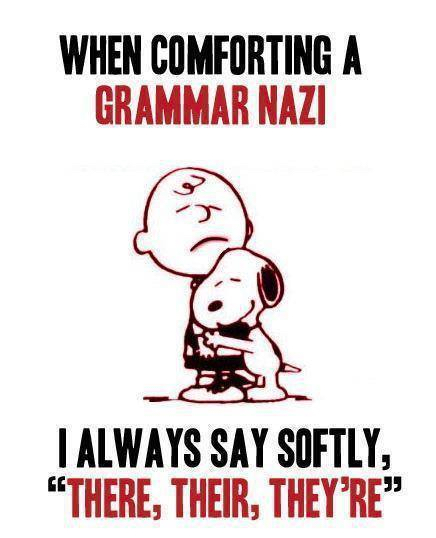|
Something to ponder on this Thursday morning...
It is better to fail in originality than to succeed in imitation. HERMAN MELVILLE I've been watching a lot of detective shows recently and besides the great story lines and trying to figure out whodunnit, the one thing I've noticed is that all the leading Chief Inspectors stick their necks out to get to the heart of the murder case/s. They put themselves, their reputation, their life and their career on the line when they get a hunch. Most of the time they get away with it (of course, this is fictional television) and it leaves me with the feeling that to get anywhere, you need to be gutsy. You need to push the boundaries. Dare to go where no man or woman has gone before kind of stuff. Don't be afraid to put yourself out there and try new things with your writing. Be a leader, not a follower. I believe if you study something for long enough, it will ultimately help you to improve.
Having the ability to read a poem and to understand what the poet is saying between the lines, as well as the techniques used, is a good starting point for writing great poetry of your own. So what are the building blocks of studying a poem? 1) Meaning - what is the poet communicating? Why does the poet use certain words and why those words and not others? 2) Look for allusions - why does the poet refer to certain things? What is the true meaning behind it? 3) Dictation and tone - what language is being used? Formal, classical, biblical, slang, popular... What is the tone of voice? Sarcastic, obnoxious, hypocritical, aggressive, grave, comical, enthusiastic, gentle, mocking, angry, optimistic... Try to "hear" the poem by reading it out loud. 4) Who is speaking and what is the situation? How many people are in the poem? 5) Grammar and syntax - if repetition is used, why is it there? 6) Figurative language gives a poem life - similes, metaphors, symbols, images, personifications - but also ask yourself why is it there and what meaning does it add to the poem. 7) Rhythm and rhyme can change the mood and feel of a poem creating abruptness and discord, or calmness through regularity. Look out for my WordUp Wednesdays. As I mentioned in my last post, reading a wide variety of material does help you grow as a writer.
I was reading an article in Psychology Today about the things that happen in our sub conscious when we read. I thought about how these different processes can be used to improve our writing and ultimately create a great novel. When I first started writing, I never considered my audience, but this was a huge mistake because if your reader can't connect on some level, they will give up on your book. Pamuk says when we read we seek out the meaning of the story, so does your book have one central idea and theme, that initial hook to get them interested in the first place? The transformation of words to images... have you built up enough descriptive text so your readers can picture your setting and characters and place themselves in your novel's world? When you've experienced something, it is so much easier to write about because you've been there and know exactly how it feels and how you reacted, but that doesn't mean you can't touch on subjects that are new to you. If you research and interview enough, you have the potential to capture the moment so that the reader will wonder if it's real experience or just imagination... However, make sure your scenes are realistic to your genre. You have to love your text and put the time into editing and revising because then you will piece together a powerful narrative that your audience will love too. People who read are always looking for that next amazing book that really moves them. Create believable characters. As readers, we are judging them, loving them, hating them, feeling sorry for them, willing them and questioning them. As a writer, keep track of your storyline. A well written novel will connect the dots for the reader into a well rounded plot. Bring all of these things together to write a satisfying story and do yourself justice. Since it's that special time of year, a post on finding writing ideas from the Bible feels very apt.
Whether or not you're a Christian, the Bible contains a wealth of stories, parables and lessons that can be adapted to a modern day setting and within the pages there are characters jumping out from every page - some surprising us, others falling from grace and then desperately searching for their redemption. Human nature hasn't changed; there's still love, humility, greed, hope, cowardice, embarrassment, jealousy and perseverance in this World. David the hero - good conquering bad - and later his adultery / Job the persecuted having his faith tested to the extreme / Abraham about to make the ultimate sacrifice / Daniel and his friends surviving being thrown into the lion's pit / Moses killing a man / Peter ashamed to know Jesus / Judas's betrayal / Jonas's cowardice / Saul who became Paul and his radical conversion on the road to Damascus / the sisters Mary and Martha - one was too busy to listen to Jesus / the brothers Cain and Abel / Noah's absolute trust in a higher being to build the ark despite all of the ridicule... Seriously, the list of intriguing characters and their stories is endless. And then we have the parables and lessons. We all know about the prodigal son and the good samaritan, but what about the unforgiving servant, the rich fool, the Pharisee and the tax collector, the wedding feast and the fig tree? All of these can be re-worked for the modern day - and there's no need to worry about the copyright! The English poet and literary critic Samuel Taylor Coleridge once described poetry as "the best words in their best order."
I started to take poetry seriously in my teens when I realised I could be rebellious with it - no punctuation... lines running into one another... no capital letters unless you really wanted to... It could be as clear as mud with multi layered meaning and significance, or as fluid as water. I write poetry after an important event in my life has taken place, or something has moved me so much that I need to express my appreciation and gratitude, my sadness and sorrow, my happiness and elation. I'm in no way an expert, but for me the precision of poetry is made up of picture creation in the mind and emotion in the heart. If those two things are achieved, you have a good poem. If you can also convey a deep insight into Life through those words, you may just have a great poem. Passed vs past gets me every time. It's one of those combis I'm never convinced I'm using correctly and the more I say the sentence aloud, the more unlikely either sound!
If you struggle with it as well, Daily Writing Tips has a great post here to help you out. We passed through the town or we past through the town? A good idea is to write the sentence in the present tense: We will pass through / We pass through... so "passed" is correct in this instance. However, as the article points out, past would be used in this context: We walked past a shop on our way to the town. Now that's where I get confused and often use passed! Receiving and understanding feedback is so important for a writer to progress, but I especially love it when people just get it - they get what I'm trying to do and what I'm trying to say. Thinking outside of the box is so important when you read anything. Never take the words, the situation or the characters at face value. When you get feedback like I received yesterday (which prompted this blog), your heart quite literally sings and it's the best feeling because you're changing someone's perception, you're enlightening them and touching them with your words. Writing empowers you. It gives you the power to make things right, cause utter devastation, challenge the status quo, turn life on its head and unleash torrents of emotion - heartache, humour, distress, excitement.... You hold destinies in the palm of your hand. I don't yet know the fate of some of my characters in The Dalton Bridges saga, but that is definitely all part of the fun.
On many writing sites we're encouraged to review our fellow writers, so we can all learn and improve and help each other on our respective writing journeys. What should you be looking out for? Well today's blog post will give you a 4-step plan to ensure you're covering the relevant areas and helping your fellow writers gain the most from your comments. We're going to be looking at character creation, plot structure, descriptions and the technicalities.
First up - characters. Some authors go down the descriptive route heightening the senses with carefully crafted places and scenes, while others write a blinding plot that keeps you turning the pages. But for me, characters are the heart and soul. Good character creation will have you connecting with them from the off. You should feel like you know them, be able to describe them, understand what motivates them and distinguish between each character you come across as the story unfolds. Personality traits should be relevant and speech should reflect personality. Nowadays plot structure is being challenged and writers are keen to break from the norm. Essentially though, every good story has a beginning, middle and end and includes conflict and resolution. A plot line should never start with too much information, but rather allow that flow of information to penetrate throughout. Is the author using everything at their disposal to disperse detail - through dialogue, character action and description. A good writer mixes it up and mixes it up well. As a reviewer, this is what you're looking for. Does the storyline flow? Is it jumpy? Is there too much suspense, or not enough? Are you anticipating the protagonist's next move with ease, or with too much difficulty? One thing to check with description - do you feel your senses are being assaulted in a good way? You will know if the author is "showing rather than telling" because you will see, hear, taste, smell, feel each scene and everything belonging to the scene like you are standing right there with the character/s. Lastly, the technicalities. Check for the usual things - grammar errors, misspelled words, commas in the wrong place, never ending sentences... Also, is the tone of the narration fitting with the mood of the story? Using the above plan will provide a good basis for your review, but remember to keep it positive and upbeat. For any writer, criticism is tough to take when we've laboured for so long over our pride and joy. This post is simply a list of bullets to get you pondering on with regards to your writing career...
|
AuthorBlogging is an amazing concept so here I am giving it a whirl. You'll get words. You'll get pics. Sometimes a vid or two. You'll get tongue in cheek, the odd humble opinion and an honest insight into my travels and writing life. Maybe even a few gems along the way. I'll be musing on home turf as I see more and more of the UK and sharing my experiences further afield on holidays and adventurous trips across the globe. Archives
December 2022
Categories
All
|




 RSS Feed
RSS Feed
